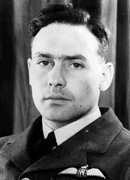John Dering Nettleton
| John Dering Nettleton | |
|---|---|
 |
|
| Born |
28 June 1917 Nongoma, Natal Province, South Africa |
| Died | 13 July 1943 (aged 26) near Brest, France |
| Allegiance |
|
| Service/branch |
|
| Years of service | 1938 - 1943 |
| Rank | Squadron leader |
| Unit | |
| Battles/wars | Second World War † |
| Awards |
|
Squadron Leader John Dering Nettleton VC (28 June 1917 – 13 July 1943) was a South African recipient of the Victoria Cross, the highest and most prestigious award for gallantry in the face of the enemy that can be awarded to British and Commonwealth forces.
Born on 28 June 1917 in Nongoma, Natal Province, South Africa, the grandson of Admiral A T D. Nettleton, he was educated at Western Province Preparatory School (WPPS) in Cape Town from 1928–30, Nettleton served as a naval cadet on the General Botha training ship and then for 18 months in the South African Merchant Marine. He took up civil engineering, working in various parts of South Africa.
Commissioned in the RAF in December 1938, he then served with Nos. 207, 98 and 185 Squadrons before joining 44 Squadron flying the Handley Page Hampden. He took part in a daylight attack on Brest on 24 July 1941 and in a series of other bombing raids and was mentioned in dispatches in September 1940. Nettleton was promoted flying officer in July 1940, flight lieutenant in February 1941 and was a squadron leader by July 1941. No. 44 (Rhodesia) Squadron was based at RAF Waddington, Lincolnshire at this time and had taken delivery of Lancasters in late 1941.
In 1942 a daylight bombing mission was planned by RAF Bomber Command against the MAN diesel engine factory at Augsburg in Bavaria, responsible for the production of half of Germany’s U‑boat engines. It was to be the longest low‑level penetration so far made during World War II, and it was the first daylight mission flown by the Command’s new Avro Lancaster.
...
Wikipedia
